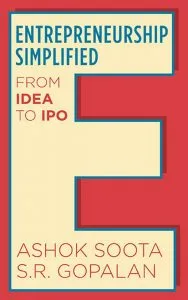Funding is the fuel for growth and scaling, says Ashok Soota in his new book for entrepreneurs
“We have a strong preference for raising funds from external sources rather than bootstrapping. Money is the fuel for accelerated growth and scaling.”

In their book, Entrepreneurship Simplified, From Idea to IPO, Ashok Soota, founding chairman of Happiest Minds, and SR Gopalan, Founder of Dawn Consulting and Bizworth India, say it like it is. The authors say,
"We have seen too many founders blow up their savings trying to get a venture off the ground and then failing."
According to them, “The one big argument for bootstrapping even if external investors are available, is when deferring the induction of investors might ensure a significantly higher valuation.” But they go on to highlight multiple approaches to increase valuation.
In an earlier interview with YourStory, Ashok Soota had pointed out that he was not in favour of bootstrapping, adding, “It is easy for me to say it, but I am not in its favour. I am saying [to startups], do your homework, make a better presentation if your proposal is rejected. If you cannot get people, who will put money in your venture, interested, how will you get others interested?”
If at all founders have some money that they would like to put into their venture, Soota and Gopalan suggest (in the book) that they put these funds as part of the first round. They add,
"The founders’ money comes in on equal terms with the investors’ money with respect to valuation. In a sense you become your own VC with such an approach."
Sound wisdom
The book comes at a time when the Indian startup ecosystem is going through a churn. If you were to compare the last three-quarters of this year with last year, there was a major decrease in investments. Indian startups saw $3.5 billion invested across 815 deals between Q1-Q3 2016, as compared last year’s (Jan to Sept) $7.3 billion invested across 639 deals.

Industry experts and seasoned entrepreneurs themselves, Soota and Gopalan distil their decades of experience for first-time entrepreneurs and those considering taking the plunge in this “Required reading for any aspiring entrepreneur,” as Nandan Nilekani says in an advance praise for the book, adding, “Even after so many years of co-creating and growing Infosys and then doing the Aadhaar project, I found many essential lessons in Soota and Gopalan’s book that will help me do better as I mentor other companies.”
The authors share their learnings through interesting anecdotes and practical wisdom. According to them, they have tried to address the “issues, challenges and dilemmas” that early stage entrepreneurs will confront during their journey all the way from idea generation to initial public offering.
The authors focus on: idea validation, how to raise funding, winning with VCs (which many entrepreneurs would definitely like to know), and how to build values and culture as the team grows. There are separate chapters on marketing and business strategy, wealth creation and sharing and of course, the initial public offering. Considering entrepreneurship is as much about failing as it is about winning, the authors have included a full chapter on failure and success.
At the end of each chapter, the authors summerise the key takeaways and reference for easy reading for the harried entrepreneur.
Top takeaways
Here’s a glimpse of some of the top takeaways, with a special focus on the chapters, Funding your Venture and Winning with VCs.

- Your chosen idea must solve a problem faced by customers. It should “be a new way of delivering an existing service or disrupt existing businesses.”
- External funding provides an impetus to accelerate to market. Besides their money, VCs provide valuable assistance as far as connections and mentorship are concerned.
- Angel investors seldom invest more than a million dollars, and if you as an entrepreneur feel you will be knocking on investors’ doors soon enough, “it is best to go to them straight away.”
- One of the most important factors to remember while raising funding is to calculate the cash required to break even. “This becomes the minimum amount to be raised across one or more rounds. Add this the money needed for acquisitions, if any.”
- The amount raised in the first round should last two or more years. You should start raising for the next round when you have cash levels enough for a year.
- The relationship with the VC will be the most important one an entrepreneur will be making in their startup journey thus it is important that it is entered with a positive approach.
- Before negotiating, understand where the investors are coming from, what is on their mind. “Don’t accept the first offer you receive.”
- A team is the most important part of a startup. The founder should demonstrate that the team members are part of a family by their behaviour and actions, especially during tough times.
- In the end, if you are not passionate about your venture, then it is a lost cause. “…But don’t get consumed by it and let it destroy your personal life. Apart from achieving financial success, entrepreneurship should be a happy and joyous journey and a journey filled with purpose to be called truly successful.”







